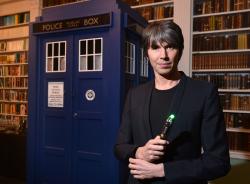Reviews | ||
If The Day of the Doctor is a vast, intergalactic exploration of Doctor Who’s fictitious mythology, steeped in pseudo-fantastical grandeur as it depicts a wealth of extraterrestrial planets beyond our own, then BBC Two’s celebratory lecture programme The Science of Doctor Who is a more grounded, logical take on that same mythology. Presented by Brian Cox, it delves into those age-old, fascinating concepts of time travel and other-worldly creatures, Cox’s perspective on the reality of such matters proving nothing short of captivating overall.
Something which will no doubt come as a pleasant shock to viewers is the inherent accessibility of this one-off instalment of scientific analysis from Cox. The English physicist’s powerful respect for the show which the programme celebrates is clear from the outset, with references to the Eye of Harmony and foes such as the Daleks thrown in for good measure throughout. At the same time, however, fans should be cautious with their expectations, for the Whoniverse can often feel like a tangential strand in the course of the lecture. There’s the sense that Doctor Who’s 50th Anniversary has simply offered Cox the chance to take up a long desired opportunity to exhibit his passionate views on the realms of science-fiction, for better or for worse. This isn’t to say that Science doesn’t come recommended as a compelling step further towards the big day, only a conceptual health warning that the show itself isn’t the key focus here. What Cox does have to say on the TARDIS’ capability of time travel and its implications is nevertheless thoroughly engaging, his manner of expression of the layered mechanisms which we perceive as operating in what we call ‘time’ neither alienating for newcomers to the field nor condescending for viewers who bring a degree of prior knowledge into the lecture. Walking such a delicate line between accessibility and depth of content can’t have been a simple prospect for the lecturer, yet on a surface level at least, he appears to pull off this particular feat with ease. In spite of the programme’s focus often lying beyond the confines of Doctor Who’s ongoing narrative, a few delectable moments of direct correlation with the travels of the Doctor do feature along the way. Matt Smith reprises his role as the character’s eleventh incarnation in a series of brief sequences aboard the TARDIS with Cox, one example of which can already be glimpsed in the BBC’s trailer for the lecture. As ever, Smith gives a bombastic performance, energetic and refusing to stand still for the most part. Although in the show’s latter fictitious segue-way scenes, his portrayal becomes that much more subtle and emotionally intricate, his final message resonating beautifully with Cox’s closing words on the potential impact he hopes his lecture may have on the younger members of his audience. Another satisfying deviation from the norm comes with Cox’s calling upon a variety of colleagues and thespians from his audience to partake in revelatory experiments. Charles Dance is a particularly memorable contributor, his likening of a test involving chemical spray and Bunsen burners not to his school days but to “psychedelic rock concerts” a brilliant, oh-so-characteristic highlight from the Game of Thrones star. Isolated moments such as these encapsulate the understated British charm that pervades the show’s fifty-year history, an admirable achievement in itself for a singular lecture which lasts barely an hour and as such only has so much time for its helm to bring across his central ideas. But if there’s one element which Doctor Who has never ceased to manipulate to its advantage, it’s that which lies at the heart of the show- time. Similarly, Cox uses the brevity of his lecture’s allotted running time to great effect, the points he presents never outstaying their welcome or becoming so convoluted as to prove detrimental to the programme’s structure. Matt’s various cameos in proceedings are welcome and satisfying to be sure, yet of greater merit is the fact that this one-off instalment would not suffer in the slightest were its fictitious sequences absent. The Science of Doctor Who may not deal with the Doctor’s mythology as regularly as fans might have expected from a programme in the BBC’s 50th Anniversary celebratory roster, but it remains an engaging watch throughout. With any luck, as Cox suggests, perhaps this single, isolated lecture will one day inspire a boy or a girl to search for the answers to time’s mysteries when they reach adulthood. In doing so, they could very well change our perspective on our world and the wider universe, just as an aspiring science-fiction drama once did on a cold Winter’s night in 1963. Filters: Television Factual 50th Anniversary |

 Home Region:
Home Region:
